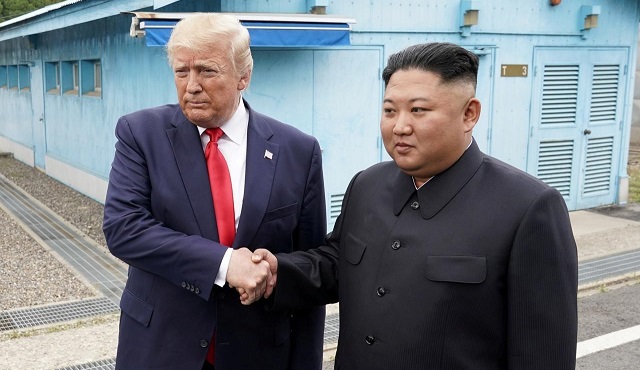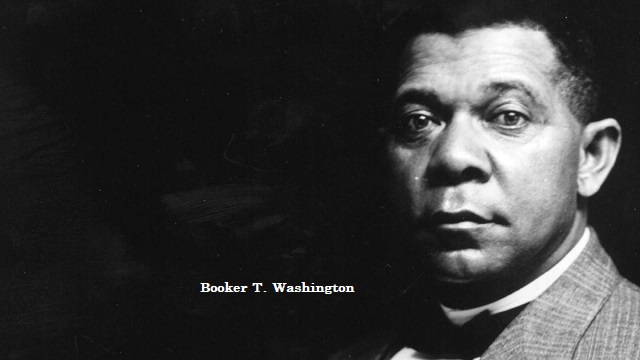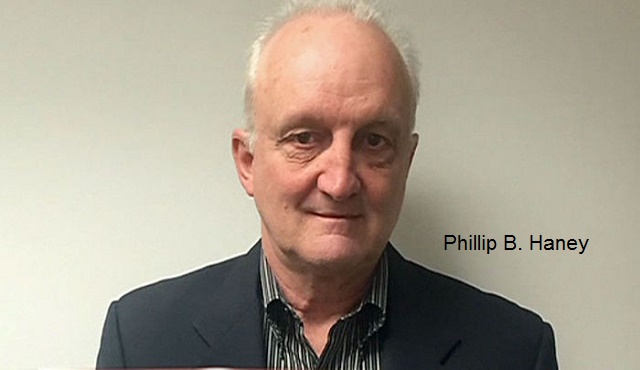VIDEO: On the Left, a New Clash Between Feminists and Transgender Activists

In January, the august New York Public Library withdrew as host of a forum organized by a self-described radical feminist group called the Women’s Liberation Front, or WoLF.
The irony was palpable: The planned meeting was titled “An Evening With Canceled Women,” since the five speakers from WoLF all claim to have been “deplatformed”—i.e., shouted down by hecklers or kicked off speakers lists—because they questioned claims made by transgender advocates regarding sexuality and identity.
In other words, as some conservative news outlets gleefully reported, the New York Public Library canceled the “canceled women”! Why?
The library had no comment, but it likely feared that it too would become a target of activists who have demonstrated and even threatened violence during other programs sponsored by the group.
In these trying times, we must turn to the greatest document in the history of the world to promise freedom and opportunity to its citizens for guidance. Find out more now >>
“It’s very common for people to say we deserve to die,” Kara Dansky, a board member of WoLF, said in a phone interview.
Actual death threats seem rare, but there are plenty of signs of an angry front opening up in the culture wars. Although religious figures and people on the right have challenged the transgender movement, the conflict with WoLF involves feminist stalwarts of the social justice left who support their fundamental rights but reject the idea that a man can truly become a woman, or vice versa.
Specifically, the ire of trans activists and their supporters has been aroused by some basic positions taken by WoLF and others, namely: 1) that a person’s sex is biologically determined and can’t be changed, even by surgery; and 2) that the pieces of legislation passed or pending in several countries and American states to extend civil rights protections to transgender people, usually called Equality Acts, are wrongheaded and harmful to women and children.
The number of liberals making those arguments publicly is still small. But it is growing. And it has already given rise to a strange reshuffling of the political deck, as some feminists of otherwise impeccable leftist credentials have formed alliances with conservative and evangelical groups that would fervently disagree with them over just about everything else—abortion and gay marriage most conspicuously.
Last January, the conservative Heritage Foundation in Washington, D.C., hosted a panel called “The Inequality of the Equality Act: Concerns From the Left,” during which several speakers from WoLF explained their point of view to a supportive Heritage audience.
Instead of provoking a full debate, these disagreements have prompted efforts to silence speech. Last year, for example, protesters accused the Toronto Public Library of endorsing “hate speech” because it agreed to provide space in one of its branches for an event featuring Meghan Murphy, the Canadian editor of an online journal, Feminist Current, and a prominent figure in the anti-transgender-rights movement.
“There is a difference between denying free speech—and what is known as de-platforming, which is when you refuse to allow hate speech to be disseminated in your facility,” read a Change.org petition assailing the library’s decision, signed by more than 9,000 people.
In Seattle, hundreds of trans supporters—some shouting “No hate, no fear, every gender is welcome here”—protested on Feb. 1 outside a public library where Murphy was on a program sponsored by WoLF.
In Toronto last year, according to the National Post, a resident of a shelter for female victims of sexual abuse, Kristi Hanna, 37, was accused of bias by the Ontario Human Rights Support Center after she complained that being forced to share a small room with a bearded male-to-female transsexual person made her feel unsafe. She left the shelter.
Lisa Littman, a professor in the School of Public Health at Brown University, lost an outside consulting position after local clinicians joined critics who objected to her peer-reviewed study that found many adolescents who claim to be trans and are being given body-altering medical treatment may be responding more to “social contagion and peer influences” than to a genuine, permanent condition.
In Britain, 54 transgenderism researchers signed a letter to The Guardian newspaper describing the intimidation they’ve experienced because they’ve raised questions about some provisions of a Gender Recognition Act being considered by Parliament.
“Members of our group have experienced campus protests, calls for dismissal in the press, harassment, foiled plots to bring about dismissal, no-platforming, and attempts to censor academic research and publications.”
Similarly, “Harry Potter” author J.K. Rowling was sharply criticized in December after she tweeted support for a British researcher who lost her job at a think tank for expressing “offensive and exclusionary” language, after she said “men cannot change into women.”
Even the feminist icon Germaine Greer has been reviled because she argues that even a man who takes hormones and undergoes sexual reassignment surgery is still a man.
“I’ve had things thrown at me,” she said in a now famous BBC interview. “I’ve been accused of inciting violence against transgender people. That’s absolute nonsense.”
Welcome, in other words, to the censorious world of the identity-politics left, where transgender rights have been recast as the new frontier of the broader civil rights movement.
New terms have emerged, including “transphobic,” which takes its place with racist, homophobic, and misogynist as the voguish terms of opprobrium for people who in many cases are by no means racist, homophobic, or misogynist, but simply depart from one or another plank of the identity-politics orthodoxy.
Women like the members of WoLF have been accorded a new pejorative acronym: TERF, for trans exclusionary radical feminist.
What’s “driving their influence” is “the false claiming of a feminist mantle to anti-transgender positions,” Ria Tabacco Mar, director of the Women’s Rights Project at the American Civil Liberties Union, told The Washington Post, speaking of groups like WoLF. “This is not a crossing of party lines. This is a principle of exclusion.”
No doubt these terms emerge from a deeply felt sympathy for trans people, who certainly do experience discrimination and even violence. Still, the speed with which this once marginal effort has gained acceptance has created ideological whiplash as new modes of thought clash with older ones.
Some feminists and other more liberal skeptics of transgender rights note there has been little conversation about a movement that makes broader demands than other pushes for civil rights.
Until now marginalized groups have demanded equal status and protection from discrimination, but they haven’t called into question some of the basic ways in which people identify themselves.
Gays and lesbians never fought to be considered straight; black people don’t fight to be considered white. But the core tenets of the ideology embraced by many transgender advocates requires society to redefine basic signifiers of identity in profound and somewhat contradictory ways, most significantly demanding that biological men be considered women, thereby recasting traditional definitions of male and female.
At the same time, it also demands that society replace such binary notions of sex with a fluid, vague, not-very-scientific notion of gender as the key defining element of a person’s identity.
The groups challenging these notions assert that sex is entirely biological and can’t be changed. But trans women have received more attention from some feminists (and others) because they believe that trans men do not present the sort of danger or discomfort to biological men that trans women do to biological women—such as sexual aggression or participation on sports teams.
Specifically, some feminists are defending protections and opportunities won expressly for women. WoLF and other critics reject the idea that a man should legally be a woman with the right to occupy protected women’s spaces simply because he says he’s one, feels like one, wears dresses, takes hormones, or even has a sex-change operation.
Beyond that, they argue that far from promoting hateful “transphobic” notions that ought to be shouted down, their goal is to protect women and children from wrongheaded ideas that would harm them.
“Disagreements over sex and gender have cleaved the feminist community,” Libby Emmons, a member of WoLF, wrote in the online magazine Quillette. This is, she continued, “an unusually vicious front in the culture war.”
There’s an irony in this. The feminist revolution of the past quarter-century was at least partly responsible for shaking up traditional notions of gender and sex; it advanced the idea that gender (like race) is largely a social construct, that most differences between the sexes are the result of culture, expectations, and upbringing, rather than biology.
As the pioneering feminist Simone de Beauvoir put it, “One is not born but becomes a woman.” This view gave rise to the emphasis on gender, or how a person feels about himself or herself, as the major element in identity, rather than sex, and from there it was only a short step to the idea that “gender identity” should have the same protected status as racial or sexual equality.
Members of WoLF and others like them dispute this, maintaining that the sexual barrier is unbridgeable.
“The third-wave feminist movement that came out of the 1990s made a mistake in saying there were no differences between men and women related to evolution and biology,” Murphy told me in a phone interview from Vancouver, where she lives. “But the big problem is the ideology of transgenderism itself, which conflates sex and gender and says it’s possible to ‘identify’ your way out of biological sex.”
“Sex is real, and it is immutable,” Murphy said at the “Canceled Women” conference in January, after it was moved to another venue in New York. “One is born either male or female and remains so for life, regardless of preference, surgery, or hormone treatments.”
“To be clear, I’m not saying that trans people don’t suffer, whether from body dysphoria or other forms of mental illness, or that people in general don’t suffer when they step outside the gendered roles laid out for us,” she continued.
“What I’m saying is that there’s no clear definition of what a ‘trans’ person is. … Trans is nothing more than a personal feeling or an announcement, which does not qualify you as part of a definable class of people who are inherently marginalized or subjected to discrimination.”
Emmons put it this way: The idea that by dressing in stereotypical women’s fashion and acting “like a woman,” a man can legally become a woman erases women as a separate category.
Moreover, she argues, the very idea that a man can be considered a woman by, say, putting on a dress and high heels derives from a stereotype about femininity that, she says, is itself “misogynist.”
“The word ‘woman’ is on the verge of having no meaning at all,” Emmons told me.
In practical terms, members of WoLF and others appear to be fighting an uphill battle, as trans rights, gender fluidity, and the nonbinary nature of some people have become widely accepted and promoted by many elite institutions, including universities, the media, Hollywood, the Democratic Party, and even the NCAA, the governing body of intercollegiate sports.
Last year the Democrat-controlled House of Representatives passed the Equality Act, now before the Senate, banning discrimination based on “sexual orientation and gender identity.” About 18 state legislatures as well as the Canadian and British parliaments have adopted similar bills or are considering them.
Although less than 1% of adult Americans identify as transgender, it is becoming de rigueur at colleges and universities for everyone to announce their pronouns. “He” and “she” are no longer the only singular options; “they” and “them,” for example, are now used to refer to one trans person as opposed to a group.
The Associated Press, The New York Times, and other news organizations now mandate the use of those pronouns. A libertarian columnist, Joe Caldera, says he was let go by the Denver Post in January because of a column that questioned the AP’s style guidelines.
The political climate on the left is such that at a town hall meeting in Iowa in January, Sen. Elizabeth Warren vowed to give a young transgender person veto power over her potential nominee for secretary of education.
Gestures like Warren’s were seen by some social media critics as pandering to a politically correct orthodoxy, but it was clearly an applause line at that town meeting.
So, why shouldn’t people who feel they were born in the wrong body be able to transition from one sex to another, and to be treated legally and socially in accordance with their adopted gender, not the sex they were born with?
“We don’t frame this as a question of trans rights,” Dansky told me, answering that question. “We want to protect the privacy and safety of women and girls.”
For WoLF’s members and those who agree with them, the implications of trans rights are stark. Because they consider trans women to be men, they are concerned about efforts to let males enter female spaces.
They argue, for example, that the “equality acts” being passed across the English-speaking world would allow biological men into spaces that have always been reserved for women, like bathrooms, changing rooms, sports teams, and prisons.
Much discussion has focused on public bathrooms. But Jennifer Finney Boylan, who identifies as a transgender woman, noted in a New York Times op-ed there is no evidence that “big hairy men” are invading ladies rooms.
Boylan further argued that there’s also no evidence on the sports teams question or any other concern that transgender people are changing things in a substantial or worrisome way. And, indeed, overall, evidence about the actual effects of equality laws and other efforts to recognize transgender rights seems largely anecdotal.
Still, some of that evidence indicates that there are plenty of instances where biological males claiming to be women have gained access to what used to be women’s-only spaces.
“I’ve spoken to two women in Texas forced to share a cell with two physically intact male prisoners,” Dansky told me. In fact, local newspapers have reported on complaints by women prisoners at Federal Medical Center in Carswell, Texas, that they are being forced to share showers and bathrooms with transgender biological male inmates being treated there.
In Massachusetts and other states, trans women are being accepted into shelters for battered women, a practice that gave rise to the case of Hanna, the victim of sexual abuse who left a shelter when she was forced to share her room with a person she deemed to be a man.
As of last year, at least 17 states allowed transgender athletes to compete without restriction, according to Transathlete.com, a website that tracks the issue.
More serious perhaps than the impact of trans rights on women’s sports or women’s prisons is the issue of medical interventions for sexually dysphobic young people, teenagers, and sometimes even younger children.
For the past 10 to 15 years, specialists in sexual dysphoria have been treating children and adolescents with medications and surgery that enable them to align their bodies with their sexual identities. The practice has passionate defenders.
Norman Spack, a pediatric endocrinologist at Boston Children’s Hospital, described in a TED talk a few years ago how his experience with sexually dysphobic children—who, he emphasizes, are few in number—led him to believe strongly in the benefits of medical interventions.
For several years, he directed a program at the hospital that administers drugs to delay the onset of puberty for younger children and hormones for adolescents that make effectively irreversible changes in their bodies, like breasts for transgender girls who were born male.
“Not doing anything for them not only puts them at risk of losing their lives through suicide,” Spack says in his TED talk, “but also says something about whether we are truly an inclusive society.”
Spack maintained that children treated in his program are rigorously evaluated and, if under 18, have to undergo months of counseling and have parental consent before they can be given drugs or undergo surgery. But there are many critics of sex-change procedures who contend that their advocates do them too quickly, dispensing with psychological examination.
Littman has found that some adolescents are responding more to social pressure than to deep psychological need, suggesting that treatment with hormones like estrogen and testosterone could be a grave mistake. She cites, for example, the case of four girls, all of whom “came out” as transgender after their coach did.
Then there is the matter of surgery, especially mastectomies on girls who want to transition to being boys.
One study published in the Journal of the American Medical Association in 2018 concluded that women and girls wishing to become men who had double mastectomies were generally happier than those who had not undergone surgery. But what disturbed some critics was the disclosure that among the people studied, 33 of them had had mastectomies before they were 18, and 16 of them had had their breasts removed when they were 15 or younger.
Not all professionals in the field believe this to be a good thing. In 2018, the American College of Pediatricians concluded that the sex reassignment protocol for children and teenagers being followed in some clinics “is founded upon an unscientific gender ideology, lacks an evidence base, and violates the long-standing ethical principle, ‘First do on harm.’”
Emmons, the member of WoLF, says there are plenty of women in their 20s who underwent hormone treatments and mastectomies who now regret them, and, indeed, a Google search for “detransitioners network” or “Pique Resilience Project” will turn up plenty of examples of exactly that.
She adds bluntly: “Children are not allowed to get a tattoo, to drink, or to vote. The only thing they’re allowed to do is destroy their reproductive systems.”
Originally published by RealClearInvestigations
COLUMN BY
Richard Bernstein
Richard Bernstein, formerly of The New York Times, is a journalist and writer who currently contributes to RealClearInvestigations. A Brooklyn resident, he is the author of nine books.
A Note for our Readers:
This is a critical year in the history of our country. With the country polarized and divided on a number of issues and with roughly half of the country clamoring for increased government control—over health care, socialism, increased regulations, and open borders—we must turn to America’s founding for the answers on how best to proceed into the future.
The Heritage Foundation has compiled input from more than 100 constitutional scholars and legal experts into the country’s most thorough and compelling review of the freedoms promised to us within the United States Constitution into a free digital guide called Heritage’s Guide to the Constitution.
They’re making this guide available to all readers of The Daily Signal for free today!
GET ACCESS NOW! >>
EDITORS NOTE: This Daily Signal column is republished with permission. © All rights reserved.














